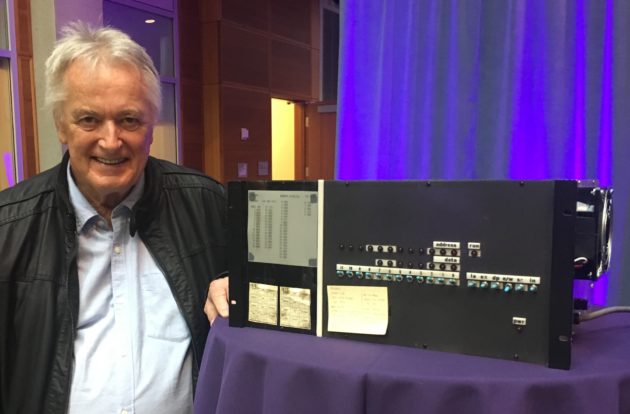
Microsoft is one of the most successful and influential companies in the world, but did you know that Bill Gates and Paul Allen launched an earlier venture as high school students in Seattle? It was called Traf-O-Data, a startup in the 1970s that developed a computer system to count traffic.
Their partner in Traf-O-Data was Paul Gilbert, who was a University of Washington electrical engineering student when Gates and Allen were using UW computer labs at night, to hone their programming skills and develop their new business.
Gilbert, now 65, recalls seeing Gates and Allen walking down a University of Washington hallway. They asked him, “Can you build us a microcomputer?” After thinking about it, he agreed to join them, and he became a partner in the business.
“I got access to the Intel information, and we bought the chip and built it from the ground up,” he recalled, speaking with GeekWire recently after Allen gave him a special shout-out from stage during an event at the UW’s newly christened Paul G. Allen School of Computer Science & Engineering.

Wrote Paul Allen in a LinkedIn post, “While Bill Gates and I handled the software side of (Traf-O-Data), the machine itself was built on campus by a UW student named Paul Gilbert, a partner Bill Gates and I recruited into our high school business venture. Paul did an amazing job turning the first 8-bit microprocessor in Seattle into a real computer.”
Allen went on to explain why Traf-O-Data was such an important venture:
Objectively speaking, Traf-O-Data was a failure as a company. Right as our business started to pick up, states began to provide their own traffic-counting services to local governments for free. As quickly as it started, our business model evaporated.
But while Traf-O-Data was technically a business failure, the understanding of microprocessors we absorbed was crucial to our future success. And the emulator I wrote to program it gave us a huge head start over anyone else writing code at the time.
If it hadn’t been for our Traf-O-Data venture, and if it hadn’t been for all that time spent on UW computers, you could argue that Microsoft might not have happened.
As their first partner, Gilbert got lots of experience working with Allen and Gates in their early years. As he recalled, “Bill was just hyperactive, his foot was always shaking and he had short patience. Very, very limited patience. And Paul was so laid-back. … Paul would say, ‘Oh, it’s OK.’ We’ll get over it.’ He’d always be the companion. And I’d say, ‘At least I haven’t been kicked off the job.’ ”
RELATED: A conversation with Microsoft co-founder Paul Allen: ‘It really is a golden age of what’s possible’
So did Gilbert ever think that Gates and Allen would go on to become some of the most successful technology entrepreneurs in the world?
“No, in fact that whole concept of having a big clunky PC in your house that just used up room, I thought that was totally dumb,” he said. “I did not have any foresight into what was really going on. I just kinda fought it in my mind, and said, ‘Nah, this is not going to work.’ ”
Gilbert went on to become a software engineer at Boeing, and today lives in Palm Bay, Fla. He got a chance to speak with Paul Allen and other tech luminaries at the recent UW event, and he was still beaming with enthusiasm after the presentation.
“It’s impossible, I can’t really be standing here in this group,” he said. “I think it’s still sinking in.”



